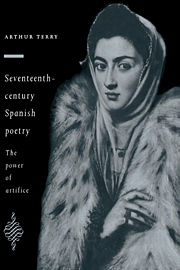Book contents
- Frontmatter
- Contents
- Preface
- List of abbreviations
- 1 The inheritance
- 2 Theory and practice
- 3 Luis de Góngora: the poetry of transformation
- 4 Lope de Vega: re-writing a life
- 5 Between two centuries: from Medrano to Valdivielso
- 6 Francisco de Quevedo: the force of eloquence
- 7 The literary epic
- 8 Plenitude and decline: from Villamediana to the second half of the century
- 9 Sor Juana Inés de la Cruz: the end of a tradition
- Epilogue
- Notes
- Select bibliography
- Index
- Frontmatter
- Contents
- Preface
- List of abbreviations
- 1 The inheritance
- 2 Theory and practice
- 3 Luis de Góngora: the poetry of transformation
- 4 Lope de Vega: re-writing a life
- 5 Between two centuries: from Medrano to Valdivielso
- 6 Francisco de Quevedo: the force of eloquence
- 7 The literary epic
- 8 Plenitude and decline: from Villamediana to the second half of the century
- 9 Sor Juana Inés de la Cruz: the end of a tradition
- Epilogue
- Notes
- Select bibliography
- Index
Summary
One kind of poetry has so far been left out of account: the literary epic. One reason for this is practical: the difficulty of dealing adequately with a genre whose chief examples run to many thousands of lines and, more often than not, are surrounded by an equally vast amount of critical debate. Another is the sense that Renaissance literary epic stands somewhat apart from the rest of the poetry of the time, both in the minds of contemporary readers and in the practice of the poets themselves – a notion that may help to explain, if not to excuse, the relative indifference of modern readers. Yet any suggestion that this is a peripheral genre is belied by Renaissance theory itself: with the possible exception of tragedy, epic is normally regarded as the highest kind of poetic writing, the most ‘magnificent’ and also the most comprehensive. Thus, as Scaliger puts it:
In every sphere some one thing is fitting and preeminent, which may serve as a standard for the others; so that all the rest may be referred to it. So in the whole of poetry the epic genre, in which the nature and life and actions of heroes are recounted, seems to be chief. According to its pattern the remaining parts of poetry are directed …
Such arguments for the centrality of epic are a commonplace of the time and derive essentially from the Renaissance reading of classical theory. If they make it clear that the epic is the genre to which every poet should aspire, they also raise the whole question of what sixteenth-century poets and theorists – often the same people – actually understood by ‘epic’ and how they conceived the actual writing of an epic poem.
- Type
- Chapter
- Information
- Seventeenth-Century Spanish Poetry , pp. 180 - 207Publisher: Cambridge University PressPrint publication year: 1993



